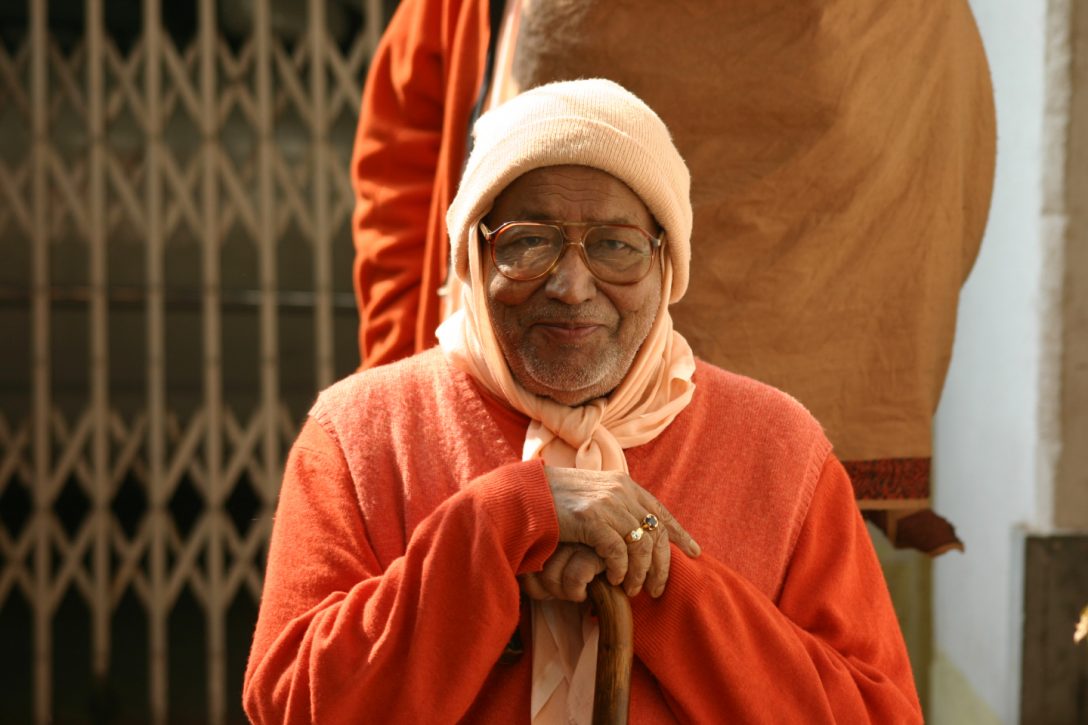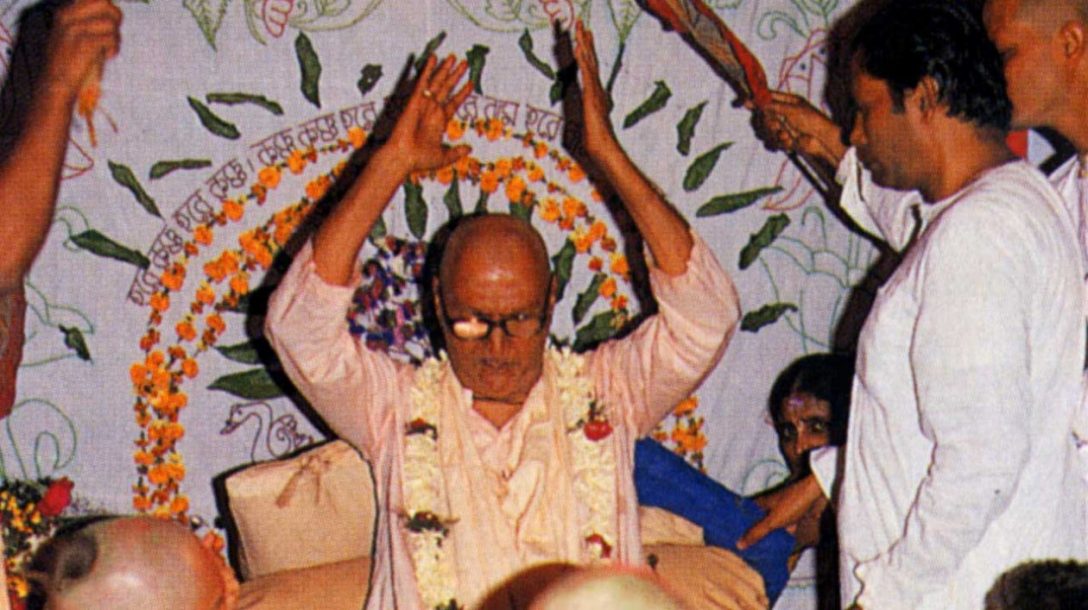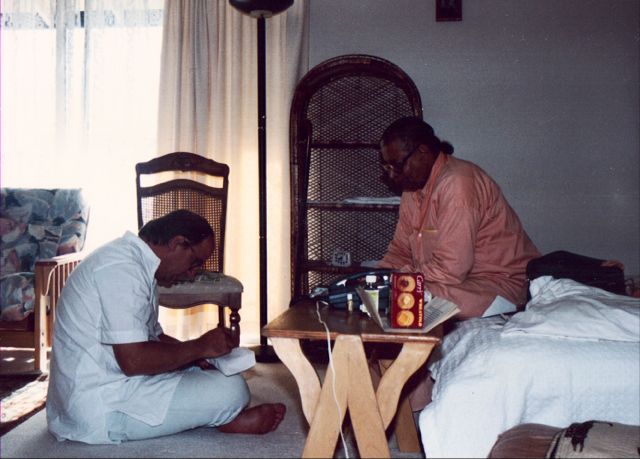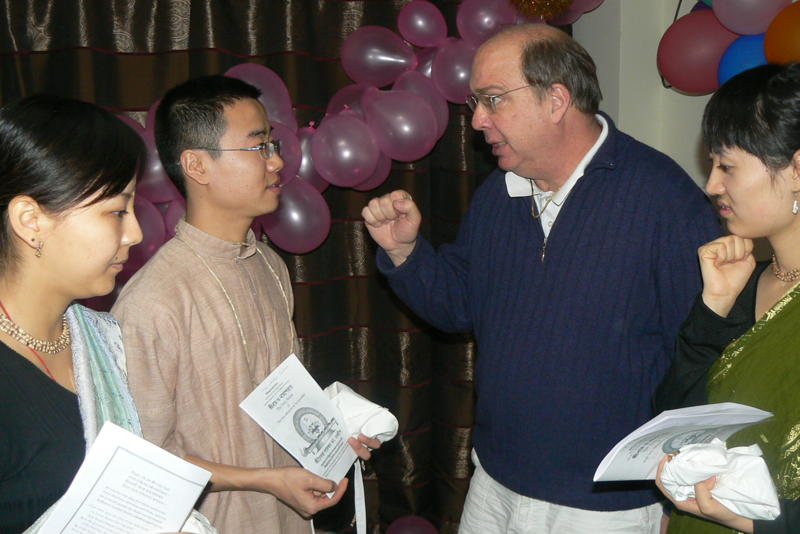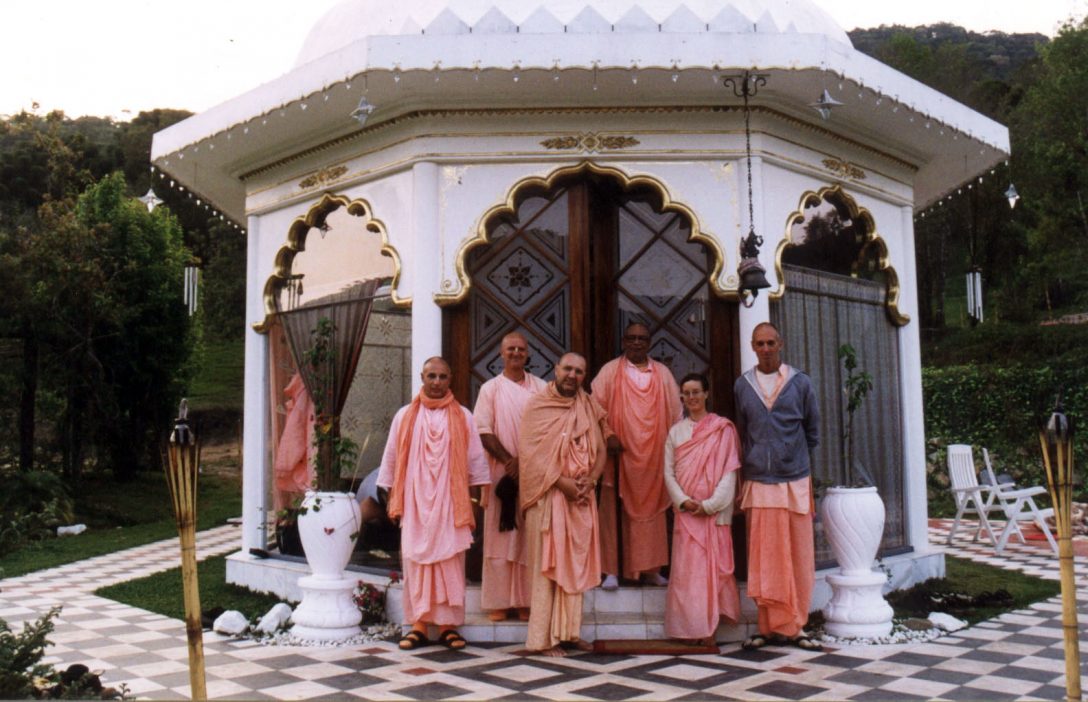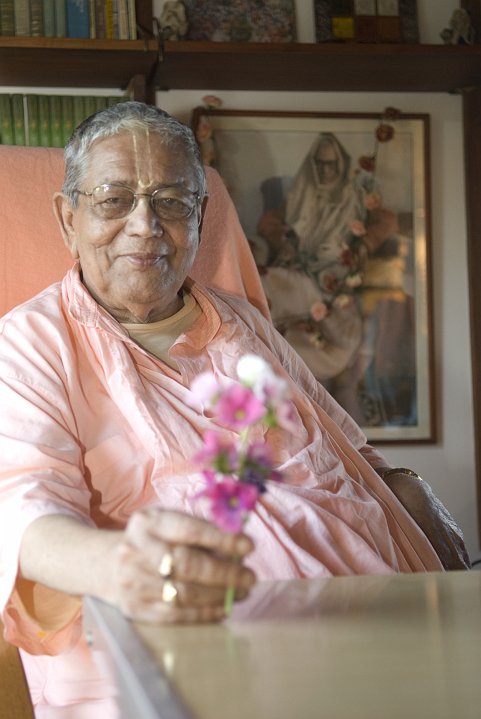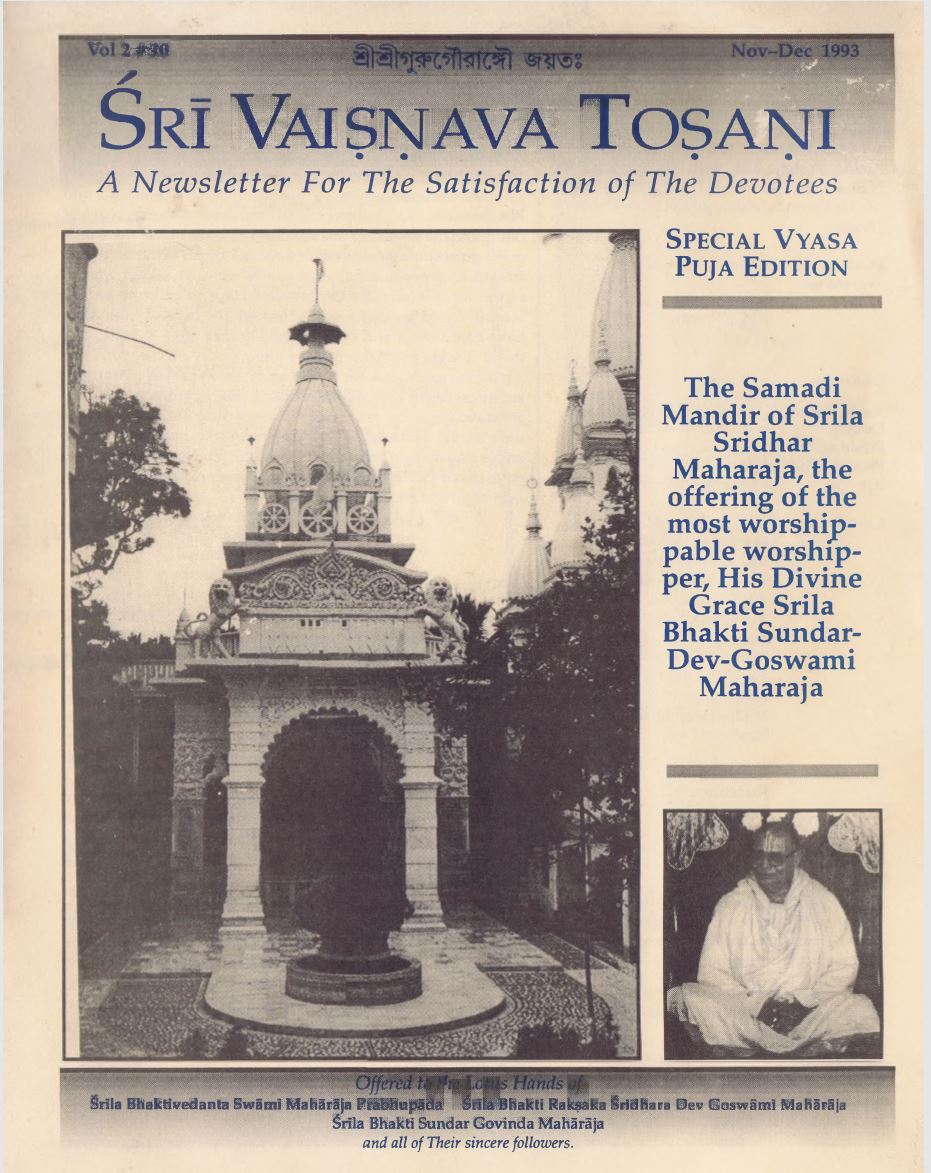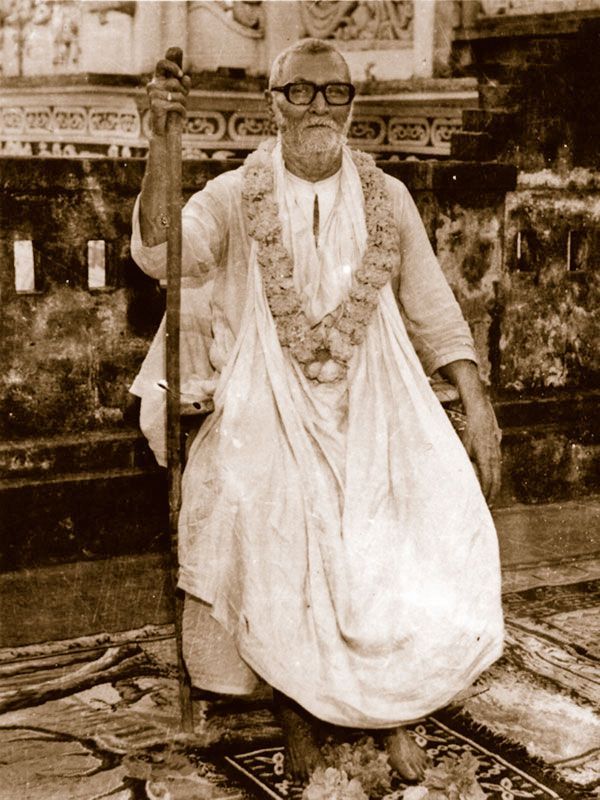“Viraha Mahotsav: A festival of separation”. Discussion last night in Sao Paulo on the divine disappearance day of our Gurudev Om Vishnupad Srila Bhakti Sundar Govinda Dev-Goswami Maharaj. English class by Vishakha Devi Dasi with translation into Portuguese by Rasikananda Prabhu.
1 hour and 20 min+ mp3 audio file
Blog
My life is only meant for Krishna
By His Divine Grace Srila Bhakti Raksak Sridhar Dev-Goswami Maharaj
Devotee: Guru Maharaj, how can we please you? What can we do that will be pleasing to you?
Srila Guru Maharaj: Krishna is for Himself, that is He exists for His own purpose, and we also exist for him. When you can adopt this line of life, for which I am also trying to use my energy wholesale, when you will join that concern, then I will be pleased.
What I am to do with this life, I like that others will also follow that. My life is only meant for Krishna, and naturally I would like that others will also follow this same route. That is only natural. “Sri Chaitanya manobhistam”, what is the desire of Sri Chaitanyadev, and accordingly, the desire of my Guru Maharaj, I want to work towards fulfilling that.
Under the direction of my Gurudev, I am following the path to Radha-Krishna consciousness, where we will enter the domain where Radharani is serving Her most beloved Lord Krishna. We consider this to be our highest goal, and anyday, anytime in this infinite time, we want to reach that goal, the highest ideal. It is our only aim in life, and we consider that everyone should accept it as their summum bonum.
What is the most faultless, purest conception of life? Exploitation is filthy, and renunciation is zero, therefore service, loving service is the highest zenith of purity. We want to prepare ourselves for that cause—the most intense loving service with no tinge of exploitation. Purity depends only on how much we can sacrifice our self for the highest object, and that is love proper. It is based on sacrifice, not on exploitation. Love proper stands on the plane of sacrifice. As much sacrifice, then that much we will have love, the basis of love must be sacrifice—the pure love. Die to live. Sacrifice does not end only in renunciation. That is only the negative side, but there is positive sacrifice. Sacrifice for the perfect cause, the absolute good. And that sacrifice is living, it does not just reach the zero and disappear, not that samadhi. No, it is the most intensified life, possessed of the highest degree of living energy. The standard of that sacrifice we cannot conceive of and we may never be able to reach that standard. Here we have some experience of heat but within the sun how much heat is there? It is inconceivable, and intolerable to us, but we cannot deny that it exists. The highest degree of heat is found in the sun and there are also substances that can stand that heat, but we can only tolerate the sun from some distance. So in the same way, we can only render service under the direction of the highest servitors. In Krishnaloka there is a special group of servitors in every rasa; dasya, sakhya, vatsalya, and madhura (servitude, friendship, parental and consorthood), and we are to reach that certain distance in relation to them where we will thrive most. We cannot stand if we venture to go nearer. So Radha-dasya is necessary, or Yashoda-dasya, Nanda-dasya, Sudhama-dasya, because their degree of serving sacrifice will be intolerable to us, due to our constitution. Only from behind them can we render our service. We can do our duty and that will be our acme. Our highest aspiration should be there, this has been recommended for us.
The first group is already there, and we can never take the place of them. Only from behind them, in the second or third line, we can do our best work, and our highest attainment will be from that position. From there we will be able to have some experience of the higher order, we will get some view how things are going on in the area of most intense heat.
One poet has written that if the fly falls into the pot of honey while trying to taste its sweetness, then he will die. Its wings will be covered with honey and it will drown there. But if, instead of honey the pot is filled with amrta then the fly won’t die, because it is amrta. Taking the sweetness of that amrta one will get eternal life.
So we cannot tolerate the “heat” but that heat is sweet heat. It will not burn us but we can’t stand, we can’t raise ourselves up to that degree. It is not within us. Just like we are limited as to what we can see. The most intense light is invisible to us, for example the X-ray. And sound, a very high sound will be inaudible to us, as will a very low sound. Only in the middle can we hear. The senses are like that, and the position of the soul is also like that, it has its range within which it thrives.
Visvanath Chakravarti has in a nutshell described what is our duty, that our object of adoration is the Lord Nandanandana, Krishna, the son of the King of Vraja, and His capital is Vrindavan. A sweet forest town. The Jamuna is there, Radha Kunda, the Govardhan Hill, and so many kadamba trees, lotus flowers—many wonderful things. A garden town, Vrindavan, that is His capital. And there we find a peculiar type of worship which has been designed by the damsels of Vrindavan, the Gopis. They have discovered a very peculiar, sweet type of service, worship of their Lord of Love. We have much charm for that. The type of worship and adoration designed by the Gopis, that is the most attractive.
How do we know that this is the truth? This may all be imagination. Where is your evidence, your witnesses, where is your guarantee that you may get that thing? Who can say that it is not purely imagination? The great scripture Srimad Bhagavatam, which is acknowledged as the very gist of all revealed scriptures, that holy book stands guarantee for us all. And what does it offer, that Bhagavatam? You are to aspire and strive so hard, but what will be your remuneration?
You will receive the fifth end of life, and that is Love Divine. You will be able to taste that nectar of Love Divine. That has been reserved for you. And where do you get that? Who has taught that? Who has given this information to you? Sri Chaitanya Mahaprabhu, that great Lord, Chaitanyadev. He has come with all these fine things, these wonderful things and our greatest respect is for this advice, this direction of our life.
Devotee: Maharaj, can we all get there?
Srila Guru Maharaj: Yes, we can all have our birth in that land. All can be accommodated there, that is the nature of the infinite. But there is gradation according to our capacity. Santa, dasya, sakhya, vatsalya, madhura, in this way the hierarchy is there. There is the clerk, the officer, the confidential officer—gradation. The friendly circle, they will have to serve under Subala, Sudhama, Sridham, etc., their eternal leaders in that rasa. In the filial circle, Nanda, Yashoda and others are the permanent leaders, and we may serve under them. In madhura-rasa also there is the selected group. So we are to be located in some area of service. So many services are there; the garland service, the food service, the fanning service, and so on. So according to my inner taste I shall be grouped there in a particular section where I will get my duty. There I will get my best satisfaction, I will be fulfilled as much as may be contained within my heart. And sometimes, like hunger, I will feel separation and then there will be union. Separation will prepare us for relishing the food even more. In this way there are so many arrangements in that land. Heart’s transaction has its facility there. Bhakti comes from the heart. Heart holds a higher position than the brain. Ruchi (taste) is the sweetest thing there. No calculation is found in Vrindavan. In Vaikuntha of course, the position of brain is there to some degree. But in Vrindavan—reflex action, inspiration, love is the moving force.
Note:
In this article Srila Sridhar Maharaj beautifully illuminates this well known verse encapsulating Mahaprabhu’s conception,
aradhyo bhagavan vrajesa-tanayas tad-dhama vrndavanam
ramya kachid upasana vraja–vadhu-vargena ya kalpita
srimad-bhagavatam pramanam amalam prema pumartho mahan
sri-chaitanya-mahaprabhor matam idam tatradarah nah parah
(Srila Visvanath Chakravarti)
“‘Our worshippable Lord is the son of the King of Vraja, Krishna, whose abode is Vrndavan. The most pleasing worship is that performed by the wives of Vraja. Srimad Bhagavatam is the flawless authority, and divine love is the ultimate goal of human life.’ This is the conception of Sri Chaitanya Mahaprabhu, and we adore it as supreme.”
This text was originally published in Counterpoint by Sriman Devashis Prabhu
More kirtan and other updates
We are very happy to announce several new updates:
Many additional kirtan recordings of Srila Gurudev and Srila Sridhar Maharaj which were originally published on vaisnava.com.
An ongoing, informal Bhagavad-gita discussion.
An Instagram page focused on SCSM community met on our travels, with relevant quotes from our Guru-varga.
Jadi Gaura na ho’to
Sing Gaurāṅga’s glories again and again, keeping your heart simple. In the ocean of this material world, no one has ever seen anyone so merciful.
Srila Gurudev singing Jadi Gaura na ho’to on Sri Gaura Purnima day, 28 February 1991.
yadi, gaura nā ha’ta tabe ki ha-ita
kemane dharitām de
rādhāra mahimā prema-rasa-sīmā
jagate jānāta ke? [1]
If Śrī Gaura had not come, what would have happened? How would we have maintained our lives? Who would have revealed to the world Śrī Rādhā’s glory and the extremes of Her ecstatic divine love?
madhura vṛndā- vipina mādhurī
praveśa chāturī sāra
varaja-yuvatī bhāvera bhakati
śakati ha-ita kāra? [2]
Who would have the great expertise needed to enter into the sweetness of sweet Vṛndāvan? Who would have any qualification for the Vraja-gopīs’ ecstatic devotion?
gāo punaḥ punaḥ gaurāṅgera guṇa
sarala kariyā mana
e bhava-sāgare emana dayāla
nā dekhiye eka-jana [3]
Sing Gaurāṅga’s glories again and again, keeping your heart simple. In the ocean of this material world, no one has ever seen anyone so merciful.
gaurāṅga baliyā nā genu galiyā
kemane dharinu de
vāsura-hiyā pāṣāṇa diyā
kemane gaḍiyāchhe [4]
I chant ‘Gaurāṅga’, but have not melted (with love). How have I maintained this body? How has Providence made Vāsu a stone rather than a heart?
(Śrīla Vāsudev Ghoṣ)
Remembering Srila Gurudev: Yudhamanyu Prabhu Seva Vikram
Remembering Srila Gurudev: Swami B.P. Janardan
In this exclusive interview with Swami Bhakti Pavan Janardan Maharaj His Holiness shares his rich experience in over twenty years of association with our Gurudev, Srila Bhakti Sundar Govinda Dev-Goswami Maharaj.
Download mp3 audio
Photo: Srimad Janardan Maharaj stands (far left) with Srila Gurudev and his entourage at the Krishna Shakti Ashram in Brazil, in 1996.
In the playground with Krishna
The gift of Sri Chaitanya Mahaprabhu
Download mp3 audio
no dīkṣāṁ na cha sat-kriyāṁ na cha puraścharyāṁ manāg īkṣate
mantro ’yaṁ rasanā-spṛg eva phalati śrī-kṛṣṇa-nāmātmakaḥ
(Padyāvalī: 29)
[“Sri Krishna’s Name does not rely upon (pancharatrik) initiation, pious works, or preparatory practices in the least; Sri Krishna’s Name produces results simply by touching the tongue.”]
With love and affection, and without offence, try to chant this Holy Name of Lord Kṛṣṇa. It will rescue everything—that power is with Kṛṣṇa-nām. The Lord’s Name is always so auspicious and can rescue everyone. But Kṛṣṇa’s Name has some speciality: He is attracting and giving His nectar. That is the speciality of Kṛṣṇa-nām. Other names of God are also so powerful and so beautiful, but Kṛṣṇa-nām is mixing with the hearts of the Kali-yuga people; it is the nearest and most extremely beautiful form of the Lord. That is Kṛṣṇa-nām.
harer nāmaiva kevalam
kalau nāsty eva nāsty eva nāsty eva gatir anyathā
There is no other alternative except Kṛṣṇa-nām. It is not necessary to do many things or anything else: only connect with Hari-nām, the transcendental divine form of the Lord. It is not my speculation, but all the scriptures have told this: in the Veda, Vedānta, Upaniṣads, eighteen Purāṇas, Mahābhārata—everywhere, even in the Āyurveda. Where is He not present? Kṛṣṇa is present everywhere.
In the Upaniṣads, that example of two birds is given: one is hearing, one is eating; one is sleeping, and another is watching. Paramātmā, who is watching, has some influence over all, and through that all the jīva-souls are getting some help. That is the special quality of Paramātmā. There is Brahma, Paramātmā, and then supremely Bhagavān.
Bhagavān means the Supreme Personality of Godhead, where we will find everything: love and affection. Śrīla Rūpa Goswāmī Prabhu says, all divine forms of God have good qualification for the jīva-souls, but Kṛṣṇa is so special. If you want to embrace Kṛṣṇa, He will be very happy with you, but other Gods are sitting in the chair, and the jīva-souls are fearful of Them. This is not the position of Kṛṣṇa.
sarvādbhuta-chamatkāra-līlā-kallola-vāridhiḥ
atulya-madhura-prema-maṇḍita-priya-maṇḍalaḥ
(Śrī Bhakti-rasāmṛta-sindhu: Dakṣiṇa-vibhāga, 141–2)
[“Kṛṣṇa is like an ocean filled with waves of pastimes that evoke wonder within everyone in the three worlds. In His activities of conjugal love, He is always surrounded by His dear devotees who possess unequaled love for Him.”]
Everything in connection with Kṛṣṇa is very familiar for the conditioned souls. You can feed Kṛṣṇa, you can play with Kṛṣṇa, you can chastise Kṛṣṇa, and you can give your love, affection, and everything to Kṛṣṇa, and Kṛṣṇa will always be very happy with you. That is the most palatable and suitable position for the jīva-souls.
We honour everyone and we must give our full daṇḍavat to everyone, but after that we will go to our playground and play with Kṛṣṇa in śānta-rasa, dāsya-rasa, sakhya- rasa, vātsalya-rasa, and madhura-rasa: servitorhood, friendship, parenthood, and even paramour love is possible with God. Who can believe it?
Kaṁ prati kathayitum īśe ko vā pratītim āyātu: to whom shall I tell, and who will believe? This śloka’s meaning is this. Kaṁ prati kathayitum īśe: to whom shall I tell? Ko vā pratītim āyātu: who will believe that Kṛṣṇa is playing with the Vraja-gopīs in the Kuñja-līlā, and playing happily in the courtyard of Nanda Mahārāj? There is no obstacle there.
kaṁ prati kathayitum īśe samprati ko vā pratītim āyātu
go-pati-tanayā-kuñje gopa-vadhūṭī-viṭaṁ brahma
(Sri Chaitanya-charitamrta: 2.19.98)
The youthful mood of Kṛṣṇa; playing with the girls of Vraja and the Vraja-vāsīns; friendship, fatherhood, motherhood; the trees are giving palatable fruits, the cows are giving so much palatable milk—it is all a very joyful situation there with God, with the Lord. With our Divine Master it is possible, and Sri Chaitanya Mahāprabhu has given a connection to us through the Holy Name. It will reveal in our heart. We need to chant without offence, and one day we must be qualified, no doubt.
Spoken by His Divine Grace in Italy at Villa Govinda Ashram during his visit in September 2007.
Vaishnava Toshani Vyasa Puja Edition
Sri Vaishnava Toshani Special Vyasa Puja Edition, Nov–Dec 1993, Vol 2 #10 is presented here.
pdf file
epub file
Contents
I Cannot Forget My Love For You
by His Divine Grace A.C. Bhaktivedanta Swami Prabhupada
Everyone Knows His High Position
by His Divine Grace B.R. Sridhar Dev-Goswami
Offerings From The Sannyasis
Offerings From Seva Vikram And Seva Sundar
Offerings From The Assembled Devotees
Offerings From The Children
Previous editions uploaded:
Jan–Feb 1992 Vol 1 No 1
March–April 1992 Vol 1 No 2
May–June 1992 Vol 1 No 3
Nov–Dec 1992, Vol 1 #6
May–June 1993, Vol 2 #2
Sept–Oct 1993, Vol 2 #3
On Tolerance
Discussion with Sriman Devashis Prabhu and Vishakha Devi Dasi, 14 October 2018.
Download mp3 audio
The Pioneer Of Sankirtan
Our Param Gurudev discusses preaching as the essence of kirtan, and the spirit of self-giving as indispensable behind all devotional practices.
You can find a full transcript and audio file of this talk here.
Question: Guru Mahārāj, very humbly I’d like to ask you a question concerning your book which I had a good opportunity to read yesterday for the first time. In the book I was very much surprised to see that the emphasis for spiritual enlightenment was in preaching, primary to japa. Japa was secondary to the preaching, the potency of preaching. And this very much surprised me because my spiritual master says that japa is the potency, the potency lies in the chanting of the Holy Name. How should I approach this?
Śrīla Śrīdhar Mahārāj: You have heard that Mahāprabhu laid stress on kīrtan. He recommended five main practices for our sādhana:
sādhu-saṅga, nāma-saṅkīrtana, bhāgavat-śravana
dhāma-vāsa, śrī-mūrtira śraddhāya sevana
sakala sādhana śreṣṭha ei pañcha aṅga
(Śrī Chaitanya-charitāmṛta: Madhya-līlā, 22.128–129)
[“One should associate with devotees, chant the holy name of the Lord, hear Śrīmad-Bhāgavatam, reside at Mathurā and worship the Deity with faith and veneration. These five limbs of devotional service are the best of all.”]
tāra madhye sarva-śreṣṭha nāma-saṅkīrtana
niraparādhe nāma laile pāya prema-dhana
(Śrī Chaitanya-charitāmṛta: Antya-līlā, 4.71)
[“Of the nine processes of devotional service, the most important is to always chant the holy name of the Lord. If one does so, avoiding the ten kinds of offences, one very easily obtains the most valuable love of Godhead.”]
Nām-saṅkīrtan, kīrtan, means to preach. The real principle, the real underlying meaning of kīrtan is to preach, to propagate.
Kīrtan, and everything, whatever is done, any form of devotion, must be devotion proper; and that means sevā, service. So our Gurudev said,
ataḥ śrī kṛṣṇa-nāmādi na bhaved grāhyam indriyaiḥ
sevonmukhe hi jihvādau svayam eva sphuraty adaḥ
(Śrī Bhakti-rasāmṛta-sindhu)
(“Although Kṛṣṇa’s Name, Form, Qualities, and Pastimes cannot be grasped by the material senses, through the spirit of dedication they manifest themselves on the tongue and to the other senses.”)
We want a connection with the super-subjective area, so only our hankering, sincere hankering for Him, and our attitude of surrender to His cause can attract Him to our level. That is transcendental; how can I come in connection with the transcendental? When I offer myself for His cause, His service. Then He will care to come down to give connection to me. So whatever transcendental affairs we are going to connect ourselves with, the sevonmukhata, this sort of spirit, attitude, must be there. Otherwise it will be only a repetition of mundane feats. Sevonmukhata, to practise to dedicate one’s own self, is mainly necessary. Whether we do kīrtan, śravaṇ, smaran, or vandan, everywhere this common factor must be present: that I want to dedicate myself for the cause of the higher, and not that I want to use the higher principle for my lower purpose. This tenor must be observed first.
And kīrtan means to preach. Saṅkīrtana tāra madhye sarva-śreṣṭha (“Of all practices of devotion, saṅkīrtan is the best”): it is difficult to control the mind, the inner aspect, but when we challenge some other person’s conception, we cannot but be all-conscious; we cannot talk irrelevantly, so we can easily have concentration when we talk about Him. That is kīrtan. When engaged in japam, my mind may wander here and there, everywhere, but when I am engaged in kīrtan, I must be all attentive, so we can control the mind which is very difficult to capture and to utilise. So kīrtanaṁ tu tato varam. Oṣṭha-spandana-mātreṇa kīrtanaṁ tu tato varam (Vaiṣṇava-chintāmaṇi): special stress has been put on kīrtan by Mahāprabhu.
Kīrtan means to preach. The environment has come and is prepared to attack me, so I shall rather make ‘offensive for offensive’—I shall attack the environment. Kīrtan means that. The whole environment is surcharged with the spirit of offensive; they are coming and attacking me from different directions, through different ideas that are already like spies within us, their agents. So, I shall take the offensive and attack the environment with the power that I received from Gurudev. That power will generate within me, and I shall attack the environment with that. That is what kīrtan means.
We are told, we have heard from our Gurudev, Bhakti Siddhānta Saraswatī, in this way, and we are trying to preach that thing to others. This is the tenor of his preaching. Preaching means to attack the environment, not to lie down passively and allow others to attack. Japam is very feeble, a weak thing: you begin japam, and whenever you awake you will find that your mind is marketing in some other place. But when you are talking about Kṛṣṇa, Mahāprabhu, to others, you cannot but be all attention. You can’t talk irrelevantly; you can automatically control your attention when doing kīrtan, when preaching. That is the advantage of kīrtan.
Our Vṛndāvan Dās Ṭhākur has also given another point. One who is doing japam is feeding himself, but one who is making kīrtan is feeding so many others. And he will receive that reaction, so his cause will be enhanced more and more. In this way we have understood it.
This is the justification of what is told in Search for Kṛṣṇa about kīrtan. Now you are to choose. I gave my explanation.
Sevonmukhe hi: our Gurudev laid stress in practising what is sevā. One must not only be disinterested, but one must be Kṛṣṇa-interested, Guru-interested. Guru is the agent representing Kṛṣṇa’s cause, and setting aside all my tendencies within, I shall surrender to the dictation of Gurudev. I shall ignore my inner impressions, and their suggestions, and inviting only what is coming from high, through my Gurudev, I shall do that. That is to practise and acquire the habit of service: self-abnegation, and to invite some higher tendency to work within me. Thereby we can acquire, we can know, we can understand what is service proper, sevonmukhata. Self-abnegation, and inviting the higher tendency to work within me with all my efforts. Total transformation is necessary through the agency of the higher world, and with that attitude I shall take the Name. Whatever I shall do, that attitude, that life must be present there, of sevonmukhata: what I am doing is not for me, but for the centre, for Kṛṣṇa. And the guarantee is Gurudev, the agent. This is the explanation.
Devotee: So japa is rather a prayer that we want to do kīrtan.
Śrīla Śrīdhar Mahārāj: It is within. Japa is within, and the disturbance is able to attack. And also, others are not being benefitted there. What did Mahāprabhu do? He is the pioneer of saṅkīrtan, not of japam.
kalau saṅkīrtanādyaiḥ sma kṛṣṇa-chaitanyam āśritāḥ
(Bhāgavat-sandarbha, verse 2)
yajñaiḥ saṅkīrtana-prāyair yajanti hi sumedhasaḥ
(Śrīmad Bhāgavatam: 11.5.32)
(“In the Age of Kali, intelligent persons perform congregational chanting to worship the incarnation of Godhead who constantly sings the name of Kṛṣṇa. Although His complexion is not blackish, He is Kṛṣṇa Himself. He is accompanied by His associates, servants, weapons and confidential companions.”)
Mahāprabhu came for saṅkīrtan. Japam is sevā mānase karibe. In Mahāprabhu’s instructions to Raghunāth Dās Goswāmī he says,
[grāmya-kathā nā śunibe, grāmya-vārtā nā kahibe]
bhāla nā khāibe āra bhāla nā paribe
amānī mānada hañā kṛṣṇa-nāma sadā la’be
vraje rādhā-kṛṣṇa-sevā mānase karibe
(Sri Chaitanya-charitamrta: 3. 6.236–237)
(“Do not talk like people in general or hear what they say. You should not eat very palatable food, nor should you dress very nicely. Do not expect honour, but offer all respect to others. Always chant the holy name of Lord Kṛṣṇa, and within your mind render service to Rādhā and Kṛṣṇa in Vṛndāvana.”)
Vraje-sevā is not for the public. If you are in that stage, you will continue that within yourself, within your mind, and not publicly. And before we reach that stage, we shall do everything publicly. Amānī mānada [we shall give respect without expecting it in return]. And our nature will be the spirit of toleration, and also to avoid causing any unnecessary disturbance to the environment, as much as possible.
Devotee: So that means we are attacking the environment, but we can’t disturb the environment.
Śrīla Śrīdhar Mahārāj: But our attitude should be passive, cool, that of a master, a master-like attitude. We shall attack our enemy, but the process must be grand, not like a weak man. We shall attack our enemy with dignity, with a dignified attitude. At heart we shall be well-meaning, “I want his good, and my cause is infinite, and he is within a teeny shell taking shelter.” We shall take a dignified position.
tṛṇād api sunīchena taror api sahiṣṇunā,
amāni[nā mānadena kīrtanīyaḥ sadā hariḥ]
(“The Lord’s Name may be always chanted by one who is more humble than a blade of grass, tolerant like a tree, free from desire for respect, and who offers respect to others.”)
And my attack will be of such nature that it will invite universal force for my backing, support.
Rāmānuja had a discourse with a māyāvādī for fourteen days, a strong fight. But Rāmānuja could not crush him. Then he came and prayed to Varadarāja, “What is this? You have accepted me as the Āchārya of a particular group, and I cannot defeat that māyāvādī. So what will be, Varadarāja? It is a very insulting position that I have created for You. I am now nothing, nowhere.” Anyhow, the engagement was there, Rāmānuja had to go and face his strong opponent; and as soon as he went, that māyāvādī fell at his feet, “Yes, I have recapitulated what you told in my mind, and that is true; and what I have told, that is false. I could understand.”
Our power is above. Varadarāja willed, and he at once fell at the feet. So, we must always be conscious of our Gurudev, Mahāprabhu. We are teeny persons, what power have we got? All our capital, the source of our success, is above our head with the Vaiṣṇava, with Guru. With this attitude we are to fight. Not to create our own egoism, to develop our own egoism; not for that, but for His cause. We are to go on in this way, with all sincerity.
When fighting with others, if I came to such a position that I couldn’t follow things properly, I used to ask myself, “Why am I here? What is my cause? Why am I supporting this?” Then I got my answer from within, “For this reason I am here.” So in that way, in many places, I could cross the layer of the oppositionist. “Have I come here with some ulterior motive, or with some sincere and higher motive?” Then if I analyse that, it will come out why I have come. “Why have I not gone to attend the māyāvādī school? Not the karmi school, not the patriots, nor others—why have I not joined them? Instead I have exclusively joined Mahāprabhu—why? What attracted me?” In this way.
Devotee: Now I have understood, but at the same time I’m much more in a turmoil, because I raised this point with my Gurudev and he said we are bhajanānandī, we are not goṣṭhyānandī…
Śrīla Śrīdhar Mahārāj: You may ask your Gurudev, and he may explain to you further, what is more private instruction for you: “I came to read this book, and there the stress is laid on the kīrtan, and the service, and you say japam. How can we harmonise, adjust?” You may ask him. And as he will tell, you do.
Devotee: There is one other question I would like to raise Mahārāj. When does one come to the understanding that one is serious? When do we come to the point when we are taking Harinam seriously?
Śrīla Śrīdhar Mahārāj: Harinam begins from the lowest position and goes up to the highest. Even the most fallen can get Harinam with only the connection of the sadhu. It is for all; at all possible stages, at all possible of fallen states, Harinam can help us. And at the same time, it goes to the highest position. But the meaning, the development in the Name, will change through the taker. By the devotee’s taking the Name of Kṛṣṇa, the whole nerve is getting jerked. And ordinary people, what will they get? They will wholesale will be attracted; it will draw the extract and take to Kṛṣṇa. The sound will squeeze our existence, our dedication, and take it to Kṛṣṇa. The result will be different depending on who is chanting, but anyone can take the Name. Rādhārāṇī is taking the Name of Kṛṣṇa. So many things may be: it is infinite. It is not finite, that we shall draw a line, “So far and no further.” It is all infinite: the sound is infinite, the figure, rūpa, colour. It is all infinite, different aspects of the infinite.
Rādhārāṇī says, “My life is sure to meet disaster and despair.” Why? She is saying to Her friends: “I have heard the Name of Kṛṣṇa, and I have surrendered fully there. I have seen the portrait of Kṛṣṇa and I have surrendered.” She does not know, still now, that the Name of Kṛṣṇa and the portrait are one and the same. So She is representing it in this way: “I have heard the Name, and I surrendered completely there. Again I found a picture, and I surrendered to that picture. And another, I heard the flute sound, and I surrendered there. So I have surrendered in three places, My friends, how can I get peace in My mind? So My life is finished, gone. I am expecting a disastrous end, I am wholesale spoiled.”
But when those three come into one, the Name, and the flute, and the portrait, what degree of joy is there! The Name has attracted Her to be empty. So what is there and what is that Name to us? It is the degree of love and affection with which we do the work, do the Name, or do service to the Deity, or whatever form outside—the inner spirit will be the be-all and end-all, everything is there. With what attitude am I approaching? Self-giving, ātmā-nivedan, sarva-svātma-nivedane, is the very criterion: how far one has surrendered himself, to what degree, for the cause? All other functions will depend on this truth, with how much intensity he has dedicated to taking the Name, or to the service of Guru, or to the Deity, or whatever, to preach, whatever—but what is the intensity of the dedication for the satisfaction of the Lord.
The gopis are not engaged always in japam, or always taking the Name on the beads, but their every activity is attracting Kṛṣṇa towards them. So all our movements will be such that they will attract Kṛṣṇa; they will be meant only to satisfy Kṛṣṇa, and nothing else. We will not do with only the lip, or the mind, or the body, with all its limbs, but everything, wholesale transformation is necessary. We shall live and move for Him. Not for anything else. That is what is the desired end. We belong completely to Him, as His slave, and He can make or mar. He has got every right over me. He may play with me in any way He likes, as playdough. Our dedication towards Him will be so much, of such quality. We must reach there any how.

